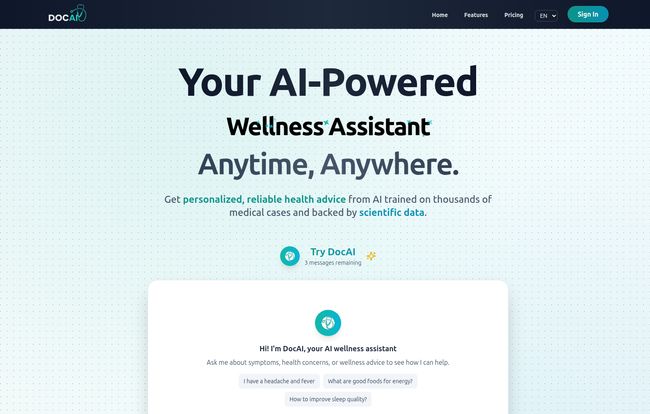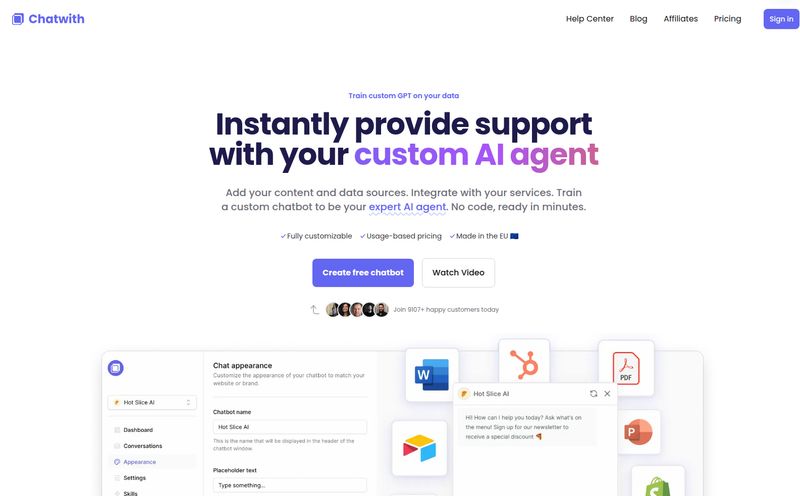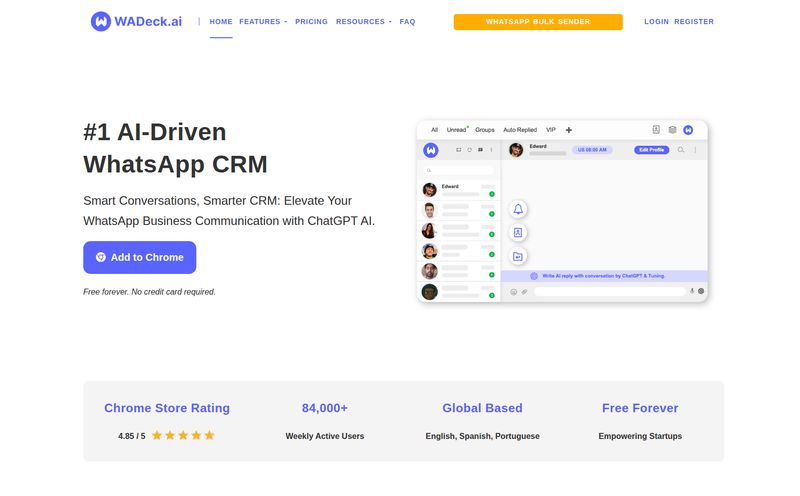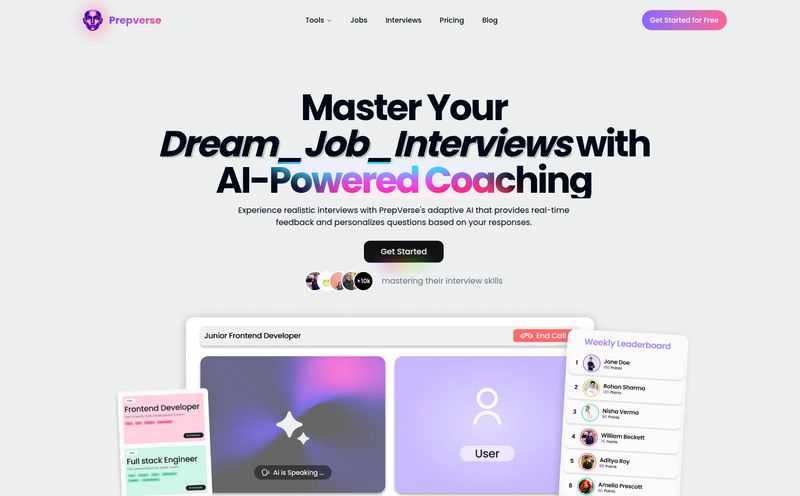It’s 3 AM. You wake up with a weird twitch in your eye, a dull ache in your side, or maybe you're just staring at the ceiling wondering if that third cup of coffee was a declaration of war on your nervous system. What’s the first thing you do? If you’re anything like me, you grab your phone and type your symptoms into the cold, unforgiving search bar of Google.
Ten minutes later, you’re convinced you have a rare, incurable disease that only affects three people in a remote village. Sound familiar? This spiral of anxiety, fueled by vague forum posts and terrifyingly worst-case-scenario medical sites, has a name: cyberchondria. And honestly, it’s exhausting.
For years, we in the tech and health space have been waiting for something better. A smarter, more contextual way to get initial health advice without booking an emergency appointment or falling down a search engine rabbit hole. That’s why when I stumbled upon DocAI, I was immediately intrigued. An AI-powered health assistant? Promising personalized, reliable medical advice? Okay, you have my attention. But is it just another gimmick, or is it a genuinely useful tool for the modern, health-conscious (and slightly anxious) person?
So, What Exactly is DocAI?
Let's break it down. At its core, DocAI is a sophisticated chatbot. But before you roll your eyes and think “oh great, another ChatGPT clone,” hold on. The key difference here is its training. Unlike general-purpose AIs that are trained on, well, the entire internet (cat memes and all), DocAI is specifically trained on thousands of medical cases and datasets. Think of it less like a know-it-all intern and more like a medical resident who has spent all its time studying symptoms, conditions, and treatment protocols.
It’s designed to be a secure, private space where you can ask health questions, get immediate recommendations, and even upload your own medical documents for a more tailored analysis. It’s a bold promise, aiming to be your first port of call for those non-emergency health questions that pop up at all hours.

Visit DocAI
The Big Question: Is DocAI Better Than Dr. Google?
This is the million-dollar question, isn't it? We've all relied on Google for so long that it feels like a default setting. But after playing around with DocAI, the difference feels like switching from a chaotic public library to a private, curated research office.
A Specialist vs. a Generalist
Googling symptoms is a mess. You get a mix of top-tier medical information from places like the Mayo Clinic, followed by questionable blog posts, ancient forum threads, and ads for snake oil. It’s on you to sift through the noise and figure out what’s credible. It’s a generalist search engine doing its best.
DocAI, on the other hand, is a specialist. Its entire world is medicine. When you ask it about a symptom, it’s not just matching keywords; it’s analyzing your query through a medically trained lens. The advice feels more focused and, frankly, less alarmist. It's a huge shift from the wild west of search results.
Security and Privacy – A Big Deal for Health Data
I don't know about you, but typing my personal health concerns into a search bar that's connected to my ad profile feels... icky. DocAI makes a big deal about being secure, private, and HIPAA/GDPR compliant. This is a massive differentiator. The idea that my health queries are handled with the same level of security as my actual medical records provides some serious peace of mind. Your late-night health worries shouldn’t become tomorrow’s targeted ads.
It Can Actually Understand Your Documents
This feature is a potential game-changer. You can upload photos (like a weird rash) or medical documents (like that blood test result you can't decipher). I once spent a solid hour trying to figure out what “high MCHC” meant on my lab report, bouncing between twenty different tabs. The ability to upload that document directly and ask, “Hey, what does this part mean in plain English?” is incredibly powerful. It empowers you to better understand the information you're already being given by your doctors.
Key Features That Actually Matter
Beyond the core chat function, a few things stand out.
- 24/7 Availability: This is obvious but crucial. Health concerns don't stick to a 9-to-5 schedule. Having a reliable tool available when you're up with a sick child or dealing with a sudden migraine can be a real comfort. It's about getting a sensible next step, not a diagnosis, but sometimes that's all you need to get through the night.
- AI First, Human Support: The website mentions that it’s “AI First, Human Support”. Right now, the human part seems to be the support team, but they have a “licensed provider referral” system listed as “coming soon”. This is the holy grail. An AI that can give you solid initial advice and then seamlessly connect you to a real, licensed professional if needed? Yes, please. That shows a responsible and genuinely helpful roadmap.
- Holistic and Smart: The platform claims to learn from your conversations and track your symptoms over time. This continuous context is something Google can never do. If you mention a headache today and fatigue next week, DocAI can potentially connect the dots, offering insights that a one-off search never could.
Let's Talk Money: The DocAI Pricing Plan
So, what's the damage? I was pleasantly surprised to see a pretty generous free plan. The DocAI Free plan gets you 3 health checks per day and basic health information. This is perfect for the curious user or for someone who just has an occasional question. It’s a great way to try it out without any commitment.
If you find yourself using it more often, there’s the DocAI Premium plan for $9.99 per month. This unlocks unlimited health checks, priority responses, deeper analysis with specialized modules, and personalized health insights. In my opinion, this tier is probably best for parents who want that constant peace of mind, or for individuals managing chronic conditions who could benefit from tracking symptoms and getting regular, data-driven feedback. For less than the cost of a single insurance co-pay, it seems like a pretty fair deal for what it offers.
The Reality Check: Where DocAI Falls Short
Alright, let's be real. No tool is perfect, especially not in the world of AI and health. It’s vital to understand the limitations.
First and foremost, and I cannot stress this enough: DocAI is not a doctor. It is an informational tool. A guide. A co-pilot. It cannot diagnose you, it cannot prescribe medication, and it should never, ever replace the advice of a qualified medical professional. If you are experiencing a serious medical emergency, you should call your local emergency services, not ask a chatbot.
Second, the output is only as good as the input. If you provide vague or inaccurate information, you'll get vague or inaccurate advice. You need to be as clear and detailed as possible to get the most out of it.
Finally, there's always a risk of misinterpretation. AI can sometimes lack the intuitive nuance of a human conversation. You still need to apply your own common sense and judgment to the information it provides. It's a powerful assistant, but you're still the one in charge of your health.
So, Who Is This Really For?
After spending some time with it, I have a pretty clear picture of who would get the most out of DocAI.
- The 'Worried Well': If you're generally healthy but tend to get anxious about minor symptoms, this is a fantastic tool to get a sensible, non-alarmist first opinion.
- Parents: For all those middle-of-the-night “is this rash serious?” or “how high is too high for a fever?” questions, DocAI can be a calming first step.
- The Data-Driven Individual: If you like tracking your health and want to understand your lab results and medical records better, the document upload feature is a killer app.
- Anyone Tired of Dr. Google: If you're simply done with the anxiety and information overload of search engines, DocAI offers a focused, private and more structured alternative.
It's not for everyone, and it's not a replacement for real healthcare. But as a tool for information, education, and peace of mind? It's one of the most promising things I've seen in the health tech space in a long time.
Final Thoughts
DocAI feels like a natural and needed evolution. We've moved from dusty encyclopedias to chaotic search engines, and now we're entering the era of specialized AI assistants. While the technology is still developing, DocAI represents a significant step in the right direction—away from fear-mongering and towards empowerment. It gives you a smart, accessible tool to better understand your own health, and in today's world, that kind of agency is priceless.
Frequently Asked Questions
- Is DocAI a replacement for a real doctor?
- Absolutely not. DocAI is an AI-powered health assistant designed to provide information and recommendations. It does not provide diagnoses or prescriptions and should never be used in place of professional medical advice. For any serious medical concerns or emergencies, please consult a qualified healthcare provider.
- How is my health data kept safe with DocAI?
- DocAI states that it is HIPAA and GDPR compliant, meaning it adheres to strict regulations for managing sensitive health information. This ensures your data is handled securely and privately, unlike general search engines.
- What does DocAI cost?
- There is a Free plan with up to 3 daily health checks and a Premium plan for $9.99/month that offers unlimited checks, advanced insights, and more personalized reports.
- What kind of documents can I upload to DocAI?
- You can upload various medical documents, such as lab results, medical reports, and even photos of physical symptoms (like a skin condition). The AI uses this information to provide more accurate and personalized feedback.
- How is DocAI different from using ChatGPT for health questions?
- The primary difference is training. ChatGPT is a general-purpose AI trained on a vast range of internet data. DocAI is a specialist AI trained specifically on thousands of medical cases and datasets, making its advice more focused, relevant, and aligned with medical knowledge.
- Can DocAI actually diagnose an illness?
- No. DocAI provides AI-powered health advice and recommendations based on the symptoms and data you provide. It is not a diagnostic tool and cannot give official medical diagnoses.
Reference and Sources
For more information, visit the official DocAI website and related health resources:
- DocAI Official Website: https://docai.com/ (Note: This is an example URL based on the tool's name)
- Mayo Clinic - Cyberchondria: Understanding Illness Anxiety



